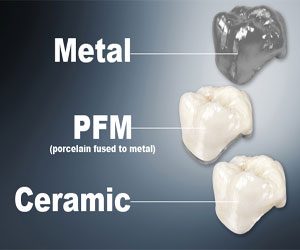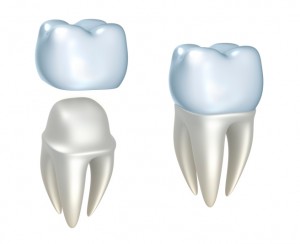Dental crowns are extremely effective for tooth restoration, even when a tooth has severe damage. But how long do crowns last? Surely your crowns must help lengthen the lifetime of the teeth they cover. Otherwise the treatment wouldn’t be considered a way to preserve your natural teeth. That said, should you view crowns as a long-term or short-term solution to fixing your teeth? Are crowns meant to cover your tooth for only a few years, or is it safe to assume they’ll last longer?
The lifetime of a dental crown
If you buy a new pair of shoes, how long will they last? Chances are you’ll be able to come up with an estimate, but varying factors will determine how long your new shoes can really last. Things you might consider in your estimate are how regularly you plan on wearing those shoes and what type of shoes they are. A sturdy pair of boots will last longer than flip flops, even if you wear them every day.
It’s the same with dental crowns. While you can consider certain factors when estimating the average lifetime of a dental crown, it’s impossible to be 100% sure how long it’ll last. Your best bet it to consider beforehand the factors that influence its expected lifetime.
With that said, dental crowns have an average lifespan of 10 to 30 years. That’s a big span, but every crown is different. While some crowns can last a lifetime, others crack soon after placement. Your dentist might estimate one crown to last 15 years, but then expect another to last about 20. And while an estimate isn’t a promise, it’s a good guideline to help you make the right choice for yourself.
Despite the fact that crowns last at least 8 years, insurance is usually willing to cover a replacement after 5 to 8 years. There’s a very good chance your crown won’t break in that time, so (financially speaking) crowns are a practical choice.
Estimating how long crowns last
 The first way to know how long your dental crown can last is by asking your dentist. This is because the current condition of the tooth you want to crown affects the life expectancy of your crown. Some teeth just can’t hold onto a crown any longer, and you’ll notice how loose it is right after placement. If the problem is your tooth itself, your dentist won’t be able to crown it. Unfortunately, you’ll have to look into replacing the tooth with an implant or dental bridge.
The first way to know how long your dental crown can last is by asking your dentist. This is because the current condition of the tooth you want to crown affects the life expectancy of your crown. Some teeth just can’t hold onto a crown any longer, and you’ll notice how loose it is right after placement. If the problem is your tooth itself, your dentist won’t be able to crown it. Unfortunately, you’ll have to look into replacing the tooth with an implant or dental bridge.
But there’s another common reason for premature crown failure. If your dentist doesn’t fit the crown properly, there’s a good chance it will keep coming loose, even only a few months after it was placed. Oftentimes, poorly fitted crowns are a product of a bad dental laboratory. If you’ve been dissatisfied with crowns in the past, your best bet is to find a dentist that uses a different laboratory. When it comes to dental crowns, the lab technician’s work is just as important as your dentist’s in ensuring a good fit.
What you do affects how long your crown lasts
But assuming your crown is well fitted and properly made, there are still things that affect how long the crown can last:
- Dental hygiene. If you don’t brush your teeth often enough, your crown won’t last as long. This is because the natural tooth inside the crown can still decay if you don’t properly care for it.
- Bad habits. If you regularly bite on hard things like ice, or if you chew lollipops instead of sucking them, your crown can break sooner than expected. Habits like grinding or clenching your teeth can have the same effect. If you suffer from tooth grinding while you sleep, it’s best to wear a protective mouth guard while sleeping. This will prevent damage to your crowned and healthy teeth.
- Crown materials. Materials used to make dental crowns vary in durability and appearance. Porcelain looks a lot like your real teeth, but it isn’t as durable as dental alloys. Dental alloys, on the other hand, don’t match the appearance of your natural teeth like porcelain. Talk to your dentist about what material will be best for you.
All things considered, crowning a tooth is still one of the best ways to restore it. Crowns are versatile and can be used for everything from keeping two halves of a cracked tooth together to preserving a tooth after a root canal. Also, if you have crown tooth pain, contact us immediately.




